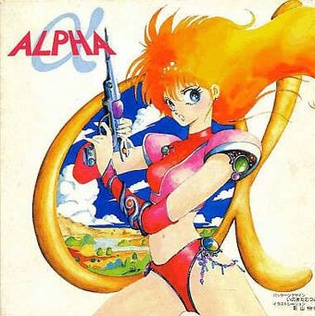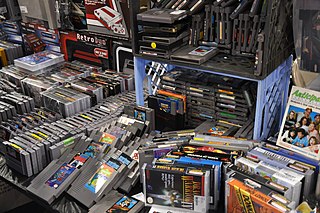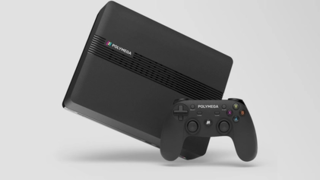
Daikatana is a 2000 first-person shooter game developed by Ion Storm. It was published by Eidos Interactive for Microsoft Windows and Kemco for Nintendo 64. Players control a swordsmaster who travels through various time periods in an effort to obtain the eponymous Daikatana, a powerful sword tied to the fate of the world.

Krome Studios Melbourne, originally Melbourne House, was an Australian video game development studio founded in 1980 by Alfred Milgrom and Naomi Besen and based in Melbourne, Australia. Initially formed to produce books and software to be published by Melbourne House, a company they had established in London in 1977, the studio operated independently from 1987 until 1999, when it was acquired by Infogrames, who changed the name to Infogrames Melbourne House Pty Ltd.. In 2006 the studio was sold to Krome Studios.

Sony Interactive Entertainment (SIE), formerly known as Sony Computer Entertainment (SCE), is a multinational video game and digital entertainment company owned by multinational conglomerate Sony. The SIE Group is made up of two legal corporate entities: Sony Interactive Entertainment LLC (SIE LLC) based in San Mateo, California, United States, and Sony Interactive Entertainment Inc., based in Minato, Tokyo, Japan. Tokyo-based SIE Inc. was originally founded as Sony Computer Entertainment Inc. in November 1993 to handle Sony's venture into video game development for the PlayStation systems. SIE LLC was established in San Mateo on April 2016, and is managed through Sony's American branch, Sony Corporation of America.

The Death Trap is a text adventure developed and published by Square for the NEC PC-8801, NEC PC-9801, and Fujitsu FM-7 in 1984. The game and its supporting computer platforms were only released in Japan. The Death Trap is the first game developed by Square, created before they were even an independent company. At the time, Square was a software branch of Den-Yu-Sha, a Japanese power line manufacturing firm; it was not until 1986 that Square was independently established.

Dolphin is a free and open-source video game console emulator for GameCube and Wii that runs on Windows, Linux, MacOS, Android, Xbox One, Xbox Series X and Series S.

Alpha (アルファ) is an interactive fiction and eroge game developed and published by Square, released for the NEC PC-8801, NEC PC-9801, Fujitsu FM-7, and Sharp X1 systems in 1986. Alpha uses a text parser to interpret the player's instructions and displays the results on screen.

Higan is a free emulator for multiple video game consoles, including the Super Nintendo Entertainment System. Originally called bsnes, the emulator is notable for attempting to emulate the original hardware as accurately as possible through low-level, cycle-accurate emulation and for the associated historical preservation efforts of the Super NES platform.

A video game console emulator is a type of emulator that allows a computing device to emulate a video game console's hardware and play its games on the emulating platform. More often than not, emulators carry additional features that surpass the limitations of the original hardware, such as broader controller compatibility, timescale control, greater performance, clearer quality, easier access to memory modifications, one-click cheat codes, and unlocking of gameplay features. Emulators are also a useful tool in the development process of homebrew demos and the creation of new games for older, discontinued, or rare consoles.

William Timothy Rogers Jr. is an American video game journalist, developer, and video essayist. His work is associated with mid-2000s New Games Journalism, a style of video game journalism that emphasizes the author's subjective and personal experiences in relation to the game world. The Guardian cited his 2005 opinion piece "Dreaming in an Empty Room: A Defense of Metal Gear Solid 2" as a core example of the genre. Rogers is additionally known for his verbose writing style and his video game reviews website ActionButton.net. He has also written for Next Generation, GamesTM, Play, Game Developer, and Kotaku. He later edited videos for Kotaku before resigning from the site and becoming an independent YouTuber.
Action Button Entertainment is a video game development studio consisting of Tim Rogers, Brent Porter, Michael Kerwin, and Nicholas Wasilewski that has produced five games: Ziggurat (2012), TNNS (2013), Ten by Eight (2013), Tuffy the Corgi (2014), and Videoball (2016). The group convened in 2010 as Rogers worked on Ziggurat based on an idea he had while playing Angry Birds that he could not complete on his own. Porter joined Action Button after responding to a call for artists Rogers made via Twitter, and Kerwin joined based on a connection he had with Rogers from producing a mockup of a game concept Rogers outlined in his Kotaku column.

The Legend of Heroes: Trails in the Sky the 3rd is a 2007 role-playing video game developed by Nihon Falcom. The game is a part of the Trails series, itself a part of the larger The Legend of Heroes series, and serves as the final entry in the Trails in the Sky arc.

Cemu is an open-source Wii U video game console emulator, first released October 13, 2015 for Microsoft Windows as a closed-source emulator developed by Exzap and Petergov. Experimental builds currently support Linux, and experimentally macOS in addition to the Windows environment available from launch. Though still under development, it is able to run the majority of games smoothly, assuming compatible hardware. The popularity of the emulator spiked with the release of The Legend of Zelda: Breath of the Wild in 2017 as Cemu successfully booted and ran the title within hours of its release.

Video game preservation is a form of preservation applied to the video game industry that includes, but is not limited to, digital preservation. Such preservation efforts include archiving development source code and art assets, digital copies of video games, emulation of video game hardware, maintenance and preservation of specialized video game hardware such as arcade games and video game consoles, and digitization of print video game magazines and books prior to the Digital Revolution.

Yuzu is a free and open-source emulator of the Nintendo Switch, developed in C++. Yuzu was announced to be in development on January 14, 2018, 10 months after the release of the Nintendo Switch.

Marvel's Spider-Man is a series of action-adventure video games developed by Insomniac Games and published by Sony Interactive Entertainment for PlayStation consoles and Microsoft Windows. Based on characters appearing in Marvel Comics publications, the games are inspired by the long-running comic book lore, while additionally deriving from various adaptations in other media. The series principally follows protagonists Peter Parker and Miles Morales, who fight crime in New York City as Spider-Men while dealing with the complications of their civilian lives.

Demon's Tilt is a pinball video game by American developer Adam Ferrando under his handle WIZNWAR, released on Steam Early Access in January 2019, with eventual publication on Microsoft Windows, Mac OS, PlayStation 4, Xbox One, and Nintendo Switch in December 2019. The game features occult inspiration pulled from H.P. Lovecraft, tarot and other horror themes. The game has been called a spiritual successor to the Crush Pinball series of pinball video games, namely Devil's Crush.
Yuichi Toyama (外山 雄一) is a Japanese video game designer, director, and producer. He used to work at Technosoft, Compile and Eighting, and is currently working at Taito since 2017. He is also a writer for the Game Culture Preservation Institute(IGCC).

Polymega is a home video game console developed by American company Playmaji, Inc. It is a retro gaming console offering backwards compatibility with several CD-based platforms: PlayStation, TurboGrafx-CD, Neo Geo CD, Sega CD, and Sega Saturn. It also supports cartridge-based platforms, including Nintendo Entertainment System (NES), Sega Genesis, Sega 32X, Super Nintendo Entertainment System (SNES), and Nintendo 64. It includes a built-in CD drive, while separate add-ons known as Element Modules provide support for cartridge-based games. It was announced as the RetroBlox in 2017, and faced numerous delays before being released in September 2021.
Emulators of the Nintendo Switch, Nintendo's current eighth-generation video game console, have been in development since 2017, less than a year after the console's release. Multiple emulators are in development, the most well-known being Yuzu and Ryujinx. Switch emulators have been widely noted by video games journalists for the swift and significant progress of their abilities to accurately emulate the console, as they are already able to run existing and new titles for the console in a playable state, sometimes within days of their release, as well as able to run on a variety of devices, including PCs running Microsoft Windows and Linux, and the Steam Deck.















